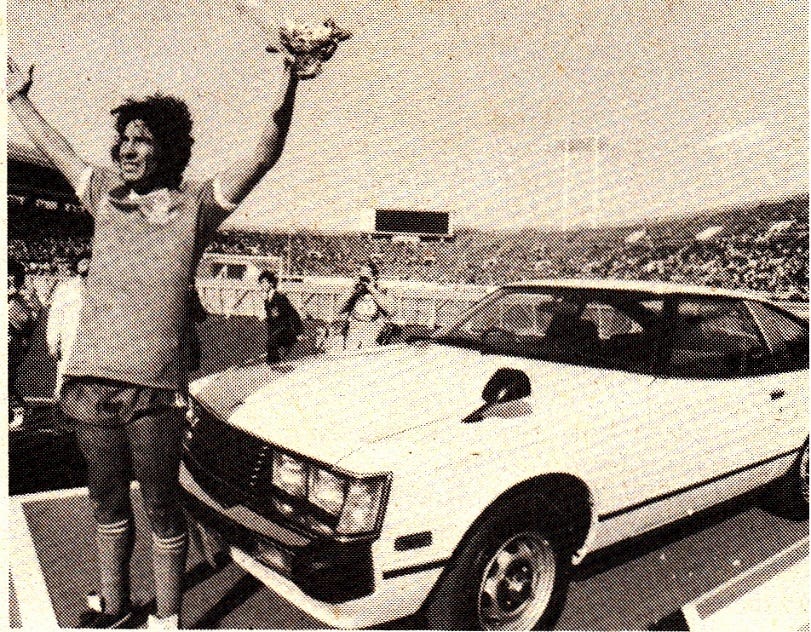Tl:dr
NEW SERIES OUT NOW: Talking to Women About The Sports Business
Maggie Murphy is asking good questions
The Long Game with Patrick Nally
Golf politics
The 10 best esports games
Napster analogies and music biz myths
Sportsbiz Objects No.5 - The Covid Vaccine
UP Coming: How to value a sports team
FFS, when are you going to do a men’s sports biz podcast series?
We - me, Sean and Laura Weston - have been working on how to create a regular podcast series that covers the business of women's sport and women's relationship to the sports business in general.
My reticence was about being able to do it properly. So Laura's contribution has been critical in getting it off the ground and guiding us to the topics and questions that we should be asking, and going beyond the usual 'aren't women inspirational' tropes.
The other question I had was whether a specific podcast was just creating another ghetto for the conversation; We’ve interviewed lots of women on the podcasts and we reference women's sport properties in our general coverage of other subject verticals. And ‘you don’t have a men’s sport podcast’ etc, shades of Richard Herring’s Twitter feed on International Women’s Day.

Talking to several people whose views we trust, the feedback was that a place to look at the business from a female perspective would be a useful thing. We'll see. I’m sure you’ll let us know one way or the other, and I look forward to hearing from you on future topics and guests as the series evolves.
Maggie Murphy is asking good questions
Most people have heard of Lewes FC because of the equality story.
But there’s more going on here than this single - very important - issue.
Of the 23 clubs that occupy England’s two elite women’s football leagues, 19 are attached to famous men’s team. The exceptions are Lewes, Durham, London Bees and London City Lionesses.
I asked Maggie Murphy, General Manager of Lewes, what this meant for her job.
‘Freedom. I have the freedom to test and trial things, and nobody can tell me, ‘No that’s not how we do it’…
Every single women’s club that’s deemed elite rents their stadium. We don’t - it’s our ground, our food outlets, our club shop, our matchday experience. My opposite numbers in other clubs would love to change the food from flabby burger and chips do some of the things we’re doing, but they can’t because they are purchasing somebody else’s food outlets and somebody else’s security, so they can’t have a conversation about developing a friendly culture at the ground.
Time and time again we see many of the teams we play against I think are set up to fail.
I fear the future of the game will require women’s teams to become more dependent on mens’ teams.
Because the speed at which we’re required to fill license requirements, every years there’s an uptick in the technical specifications we have to fulfil…quality of floodlights weren’t bright enough in the event that we might qualify for the Champions League or have Sky come down to film a game…
I worry that if we’re being pushed to become this really beautiful, glossy product that is super sellable around the world - too quickly - you’re effectively saying that you need a big rich men’s club to stump up the cash immediately in the hope that the return on investment will come over the course of several years…particularly with all the talk of the future ownership of the league, and private equity potentially buying in. They don’t want to hang around for sustainable growth, they need a return quickly.
Another question is about the packaging of the women’s game. To be deemed successful does the coverage of WSL have to look and feel like the Premier League?
The WSL teams are doing a good job now of promoting their women’s teams but have you noticed its very similar to how they promote their men’s teams…lots of moody shots of players with their arms folded.
…we’re in danger of conflating professionalism with what we have come to think of as looking professional.
The women’s game is a different product, and I’d like the freedom to package it up in lots of different ways.
….people want to know what you stand for. And if we’re looking for silver linings from the pandemic, it has revealed what football stands for, good and bad.
A couple of Premier League teams dropped their women’s teams as soon as the going got tough. Well, that showed their true colours.
And others have really stepped up and done incredible work in the community.
Hear the full podcast with Maggie Murphy.
Read her regular Medium posts here (the one on FA Cup funding is v.good)
Watch her TEDx talk below.
The Long Game
Patrick Nally’s career is the story of the sports marketing industry (UP Pod #137) and you’re left with the sense that many of today’s sportsbiz conversations have very deep roots, going back many decades.
For example, take FIFA’s ambitions in relation to the club game. In 1981, Nally had the job of organising the Toyota Cup, the new name for FIFA’s Intercontinental Cup between the champions of Europe and South America. This meant European Cup winners Nottingham Forest were expected to fly to Tokyo on a cold Sunday morning in February, straight after an away game at Man City.
The quick version of this story involves the following words: Nally, brown envelope, cash, Brian Clough.
The game was a boring 1-0 win to Nacional Montevideo from Uruguay.
And Patrick ensured the scorer got a Toyota Celica (click the pic to read the full story).
Moscow ‘80 to Beijing ‘08: The Paul Casey Guide to Sports Politics
Paul Casey has had a conversion on the road to Saudi Arabia.
In 2019, the Arizona based English golfer took a much praised and very unusual position for a pro golfer. He chose to forego appearance money to play in the European Tour’s then-new Saudi event.
“It just didn’t sit well with me. I’ve not talked too much about it and I’m not sure I want to, but certainly signing a deal and being paid to be down there … I would be a hypocrite if I did that. Anybody who says sport isn’t political, that’s rubbish. Sport is very political. I’m glad I took a stance, more so if it highlights the issues within the region, especially next door in Yemen. I’ve seen the numbers. In Yemen, 22 million people are facing starvation, 11.5 million of them kids. I didn’t want anything I do to get in the way of a great organization like UNICEF.”
This week he’s playing in Saudi, and he’s talking engagement, sunlight and disinfectant.
“A couple of years ago, was that I think I was a little bit torn,” he said on Tuesday, two days removed from winning the Omega Dubai Desert Classic. “I’m a father. I’ve got two kids. Because of my charitable ties with UNICEF, I felt that it was not right for me to play. But I’ve spent the last two years thinking about that a lot. I’ve learned an awful lot. I’ve read an awful lot. And one of the things that I was flat-out wrong on was that UNICEF is not a political organization. Their focus is purely on the vulnerability of children around the world. That’s my focus with my charitable views and endeavors.
“And so I was reminded that if you stay away, if you don’t engage, if you don’t talk, if you don’t visit, then you’re merely hardening positions,” Casey continued. “Engagement and inclusion is really what it’s all about. Things are not black and white. It’s very much a grey area. There’s not a country on the planet that meets every single rights of a child, not a single country on the planet. And so all you can hope for is that a country is on a path towards meeting as many of those as possible. This country is making progress. That’s all I can hope for. I felt that if my participation this year can assist in that process and if that can make a difference, then that’s something important. So I will hold my hand up and say that the position I had two years ago was probably not the right position to have. And so that is why I am here.”
But the Mirror’s golf corr asked a tricky one.
Some detail on the Loujain al-Hathloul case here:
Coincidentally on the same day of the aforementioned Saudi Golf press release it was reported by National Public Radio’s International Affairs Correspondent Jackie Northam that the Saudi Arabian trial of activist Loujain Al-Hathloul was to be transferred to terrorism court. The activist came to prominence in her public defiance against the ban on women driving. Her sister Lina speaking from Berlin is of the opinion that the whole new women empowerment concept in Saudi Arabia is only a public relations stunt. Surely it is a frightening state of affairs that Saudi men can still file cases against daughters, wives or female relatives under their guardianship for “disobedience,” which can lead to forcible return to their male guardian’s home or imprisonment.
PS.
Has Patrick Reed been tweeting under an anonymous account to criticise his fellow players, including the hilariously bitter suggestion that Justin Thomas didn’t deserve to be on the cover of the PGA Tour’s 2K21 video game? Not sure. But Golf Digest spotted something odd after a rules snafu last weekend.
UP Yours
Fresh from the guest blog.
Linkworthy
Beware the Napster analogy. See the three myths of the music biz.
Sportsbiz Objects
No.5 The Covid-19 Vaccine
#Markets #Politics #Ethics
IOC and WADA veteran Dick Pound said the ‘most realistic way’ to get the Tokyo Games ahead was for Olympic athletes to be prioritised for the Covid-19 vaccine.
Thomas Bach walked that idea back, saying IOC was “not in favour” of athletes jumping the queue for vaccines.
Jon Tibbs thinks each country will makes its own rules.
Each nation will need to find its own solution based on their moral, ethical and medical imperatives. This is bound to bring out the best and worst in human nature.
I think Jon’s right about this.
Some politicians, some governing bodies and some coaches will seek to get the vaccine to their athletes ahead of other groups in society. There will be a market, turning the vaccine in to a commodity to be traded.
In other words, we’re in Michael Sandel country.
Sandel wrote a great book called What Money Shouldn’t Buy. Without quite realizing it, says Sandel, and without ever deciding to do so, “We drifted from having a market economy to being a market society.”
A market economy is a tool—a valuable and effective tool—for organizing productive activity. A market society is a way of life in which market values seep into every aspect of human endeavor. It’s a place where social relations are made over in the image of the market.
As Jon Tibbs points out, being seen to play fair with the vaccine is critical for the IOC. Because fairness is what it’s supposed to be all about.
UP Coming - Money Talks
Episode 6: How to value a sports team.
Out tomorrow, search ‘Unofficial Partner’ in Apple Podcasts, Google, Spotify or your favourite podcast app.
Enjoy this newsletter? Tell your friends
Subscribe to the Unofficial Partner podcast.
Help us game the Substack algorithm by liking this newsletter and spread the word on social media.
Follow @RichardGillis1 and @PaulPingles (aka the ill-judged Twitter handle of Sean Singleton, the UP co-founder).
Read our 100th gushing five star review on Apple Podcasts - click the link to add yours.










